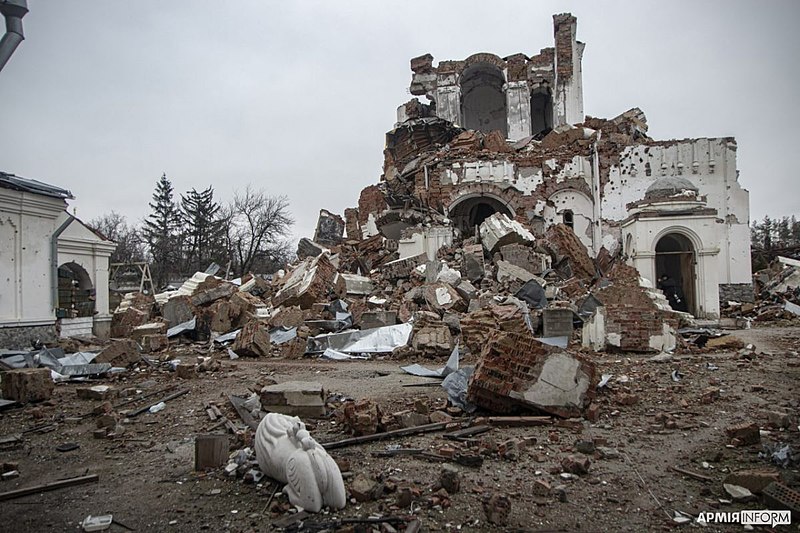This year’s recipients of the Nobel Peace Prize spoke out against the ongoing war that Russia is waging on Ukraine, which is moving toward its 10th month. The recipients sent a strong, unified message but had some differences in their condemnation of Russian leader Vladimir Putin and the Kremlin.
This year’s Nobel Peace Prize award recipients went to jailed Belarusian activist Ales Bialiatski, the Russian human rights organization Memorial and the Ukrainian Center for Civil Liberties. Bialiatski’s wife Natallia Pinchuk accepted the award on his behalf during the ceremony in Oslo that takes place every December 10, the day that Alfred Nobel died in 1896.
“Ales and we all realize how important and risky it is to fulfill the mission of civil rights defenders – especially in the tragic time of Russia’s aggression against Ukraine,” Pinchuk told Al Jazeera.
Oleksandra Matviichuk of the Ukraine Center for Civil Liberties dismissed the calls for Russia to keep the supposedly annexed parts of Ukraine in a political compromise.
“Fighting for peace does not mean yielding to pressure of the aggressor, it means protecting people from its cruelty,” said Matviichuk. “Peace cannot be reached by a country under attack laying down its arms. This would not be peace, but occupation.”
Jan Rachinsky of Memorial said that the current state of civil society in Russia is a reflection of its own “unresolved past.” Rachinsky ripped into the Kremlin’s efforts to denigrate Ukraine’s history, statehood, and independence, as well as that of former Soviet Union countries, saying that it turned into the Kremlin’s “justification for the insane and criminal war of aggression against Ukraine.”
The British defense ministry on Monday issued its latest intelligence bulletin, noting the previous comments made by Kremlin spokesman Dmitry Peskov regarding Moscow’s intentions for the war. The ministry said that the goals appear to be unchanged.
The ministry said that Moscow is still likely looking to control the four regions it claims to have annexed: Luhansk, Donetsk, Kherson, and Zaporizhzhia and that Russian military planners are likely looking to prioritize further advancing into Donetsk.
However, the ministry said that Russia may fail to achieve its goals as the Russian military appears unable to “generate an effective striking force” that could recapture the four areas.



 U.S. Lawmakers to Review Unredacted Jeffrey Epstein DOJ Files Starting Monday
U.S. Lawmakers to Review Unredacted Jeffrey Epstein DOJ Files Starting Monday  China Warns US Arms Sales to Taiwan Could Disrupt Trump’s Planned Visit
China Warns US Arms Sales to Taiwan Could Disrupt Trump’s Planned Visit  Trump Says “Very Good Talks” Underway on Russia-Ukraine War as Peace Efforts Continue
Trump Says “Very Good Talks” Underway on Russia-Ukraine War as Peace Efforts Continue  Federal Judge Restores Funding for Gateway Rail Tunnel Project
Federal Judge Restores Funding for Gateway Rail Tunnel Project  U.S.-India Trade Framework Signals Major Shift in Tariffs, Energy, and Supply Chains
U.S.-India Trade Framework Signals Major Shift in Tariffs, Energy, and Supply Chains  Trump Signs Executive Order Threatening 25% Tariffs on Countries Trading With Iran
Trump Signs Executive Order Threatening 25% Tariffs on Countries Trading With Iran  Missouri Judge Dismisses Lawsuit Challenging Starbucks’ Diversity and Inclusion Policies
Missouri Judge Dismisses Lawsuit Challenging Starbucks’ Diversity and Inclusion Policies  Ohio Man Indicted for Alleged Threat Against Vice President JD Vance, Faces Additional Federal Charges
Ohio Man Indicted for Alleged Threat Against Vice President JD Vance, Faces Additional Federal Charges  U.S. to Begin Paying UN Dues as Financial Crisis Spurs Push for Reforms
U.S. to Begin Paying UN Dues as Financial Crisis Spurs Push for Reforms  Nighttime Shelling Causes Serious Damage in Russia’s Belgorod Region Near Ukraine Border
Nighttime Shelling Causes Serious Damage in Russia’s Belgorod Region Near Ukraine Border  Jack Lang Resigns as Head of Arab World Institute Amid Epstein Controversy
Jack Lang Resigns as Head of Arab World Institute Amid Epstein Controversy  New York Legalizes Medical Aid in Dying for Terminally Ill Patients
New York Legalizes Medical Aid in Dying for Terminally Ill Patients  Trump’s Inflation Claims Clash With Voters’ Cost-of-Living Reality
Trump’s Inflation Claims Clash With Voters’ Cost-of-Living Reality  TrumpRx Website Launches to Offer Discounted Prescription Drugs for Cash-Paying Americans
TrumpRx Website Launches to Offer Discounted Prescription Drugs for Cash-Paying Americans  Trump Allows Commercial Fishing in Protected New England Waters
Trump Allows Commercial Fishing in Protected New England Waters  Japan Election 2026: Sanae Takaichi Poised for Landslide Win Despite Record Snowfall
Japan Election 2026: Sanae Takaichi Poised for Landslide Win Despite Record Snowfall 































